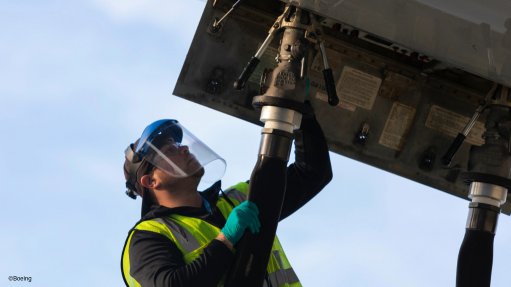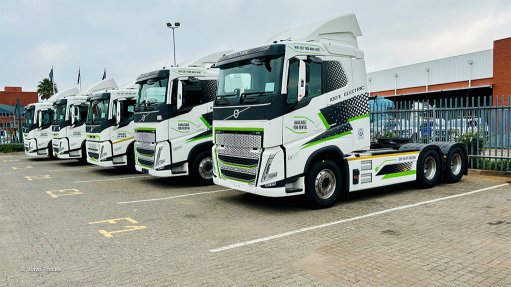Imperial’s Health Initiatives Working For Good In Africa
This article has been supplied as a media statement and is not written by Creamer Media. It may be available only for a limited time on this website.
As a major sponsor of AIDS 2016, the international AIDS conference being held in Durban in July, Imperial believes in improving and facilitating healthcare across Africa.
Says Dr Iain Barton, Imperial Group Business Development Executive: Healthcare, “it is vitally important for the private sector to work in partnership with Governments and the international donor funds to ensure that every patient in Africa has access to the medication and healthcare facilities they require.”
Imperial welcomed the news this week that US$410 million has been donated through the US President’s Emergency Plan for AIDS Relief , to help end the AIDS epidemic in South Africa. PEPFAR also supports projects in SA to reduce new HIV infections in girls and young women.
The international AIDS conference is held every two years and was last hosted in South Africa ten years ago. Dr Barton notes how much has changed in healthcare over that period of time. He says that donor agencies are working with local businesses across the continent to establish a better model for healthcare, one which focuses on the emerging potential of the black middle classes, and one in which the private sector in African countries is more involved. The key area for such healthcare development is in the distribution of essential pharmaceuticals into African markets. This is development with a capital D, focused on sustainability and long term local growth.
Imperial will be hosting a satellite session at the conference on Tuesday 19 July from 17h00 to 18h00. Special guests include Dr Mark Dybul, executive director of the Global Fund to fight AIDS and Nevin Bradford, CEO of Cipla Quality Chemicals, Uganda and Shabir Banoo, Right to Care. The topics include Big “D” Development, local manufacturing, south-south trade and the role of the private sector in healthcare delivery.
Imperial’s Health Sciences division focuses on helping African countries to improve the healthcare supply chain, by working with donor organisations get medicine to the people who need them. Health ministries are assisted in allocating capacity through skills, systems, infrastructure and operating processes.
Barton believes that there never needs to be a situation in which there is no insulin in the whole of Kenya for 60 days, which has occurred in the past. He adds, “If a cure for Ebola is found tomorrow, it could be delivered to the points of need around Africa very rapidly, through Imperial’s network.” In delivering millions of drugs to millions of people in Malawi, Imperial is developing and empowering local truck owners in Malawi to employ others and build their businesses so that they can sell their services across sectors. Imperial has the client base and the local company provides the deliveries. Imperial also has technology which allows visibility and control of transactions from purchase to delivery.
Barton says, “It is a real concern that all the ARVs provided to patients in South Africa and on the continent are manufactured offshore. Although manufacturing in Africa may not bring down the prices, it would benefit countries’ balance of payments and help to reduce their dependence on imports, which would be good for local economic development. It would also provide encouragement for local students to qualify in related medical fields. It would benefit Africa if money for medicines is spent on the continent rather than across the waters. Through his interaction with donor agencies, Barton knows that they would be keen to purchase ARVs in Africa for African patients.
DELIVERING ARVs IN KENYA
With approximately 1.6 million people living with HIV/AIDS in Kenya, ensuring a secure and sustainable supply of medications and diagnostic tests was a matter of life and death for the health ministry. Imperial has provided the solution by delivering life-sustaining rapid test kits (RTKs) to 4,500 sites throughout Kenya.
UNJANI CLINICS
Imperial’s response in 2010 to the overburdened public health sector in South Africa has resulted in the establishment of 21 clinics owned by professional female nurses. It is the first private sector initiative to start a primary healthcare network run and owned by professional nurses. This model offers affordable primary healthcare at a consultation fee of only R180 including medicines, to low income patients. To date the clinics have delivered healthcare services to more than 100,000 people.
Based on a completed application and achievement of minimum selection criteria (professional nurse with at least 5 years phc experience, dispensing certificate and clear credit and criminal checks) the nurse selects a site, performs a site and community survey to determine the need and support for a clinic and presents a business plan. Within 7 days of being awarded an Unjani clinic, the unit can be erected and be up and running. One nurse can manage up to 750 patients a day and the clinic breaks even at 250 patients.
At the end of 2015, Unjani Clinics won the health category award at the “Investing in the Future and Drivers of Change Awards”, hosted by the Mail and Guardian and the SA Trust.
CLINIC-IN-A-BOX
Imperial’s Clinic-in-a-box is an innovative turnkey infrastructural concept for the rapid deployment and commissioning of a clinic. These prefabricated structures can be erected within less than a day, and contain all the components necessary to deliver a total primary healthcare solution, packed and ready for delivery in 20 to 40 ft containers.
Clinic-in-a-box is a unique solution to infrastructure challenges in Africa, and won the Corporate innovation Award at the 2015 SA Innovation Awards.
FUNDING DISADVANTAGED MEDICAL STUDENTS
Adding impetus to its drive to boost delivery in SA’s stretched and under resourced public healthcare system, Imperial is contributing to a project which is funding 100 medical students from historically under-served rural communities.
Says Barton, “Imperial is a founding member of the Public Health Enhancement Fund that represents a ground-breaking collaboration between the Department of Health and a group of private health sector organisations. The first project is a R20 million initiative aimed at addressing SA’s chronic shortage of doctors, particularly in rural areas.”
Comments
Press Office
Announcements
What's On
Subscribe to improve your user experience...
Option 1 (equivalent of R125 a month):
Receive a weekly copy of Creamer Media's Engineering News & Mining Weekly magazine
(print copy for those in South Africa and e-magazine for those outside of South Africa)
Receive daily email newsletters
Access to full search results
Access archive of magazine back copies
Access to Projects in Progress
Access to ONE Research Report of your choice in PDF format
Option 2 (equivalent of R375 a month):
All benefits from Option 1
PLUS
Access to Creamer Media's Research Channel Africa for ALL Research Reports, in PDF format, on various industrial and mining sectors
including Electricity; Water; Energy Transition; Hydrogen; Roads, Rail and Ports; Coal; Gold; Platinum; Battery Metals; etc.
Already a subscriber?
Forgotten your password?
Receive weekly copy of Creamer Media's Engineering News & Mining Weekly magazine (print copy for those in South Africa and e-magazine for those outside of South Africa)
➕
Recieve daily email newsletters
➕
Access to full search results
➕
Access archive of magazine back copies
➕
Access to Projects in Progress
➕
Access to ONE Research Report of your choice in PDF format
RESEARCH CHANNEL AFRICA
R4500 (equivalent of R375 a month)
SUBSCRIBEAll benefits from Option 1
➕
Access to Creamer Media's Research Channel Africa for ALL Research Reports on various industrial and mining sectors, in PDF format, including on:
Electricity
➕
Water
➕
Energy Transition
➕
Hydrogen
➕
Roads, Rail and Ports
➕
Coal
➕
Gold
➕
Platinum
➕
Battery Metals
➕
etc.
Receive all benefits from Option 1 or Option 2 delivered to numerous people at your company
➕
Multiple User names and Passwords for simultaneous log-ins
➕
Intranet integration access to all in your organisation


















